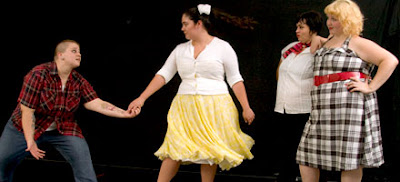Old news to some, but since its getting some attention on NPR and The Today Show, I thought it was worth linking to
Kim Brittingham's essay about her mass transit stunt, "Fat is Contagious". I probably shouldn't call it a stunt, since its really more performance art if you ask me. Frustrated at the way people refuse to sit next to fat people on buses and subways, Brittingham created a fake book cover titled "Fat is Contagious: How Sitting Next to a Fat Person can make you Fat".
Its a terrific essay and something most fat people will be readily familiar with. I know I got this treatment all the time riding the Orange Line in Boston. For all the constant fussing about how us fatties are squishing people on mass transit, the reality is scarcely recognizable. First off, most of us will stand even if there is a seat we can easily fit into just because we don't want to deal with the hassle of people getting upset at our presence. I know I do, and frankly I've never seen a fat person force themselves into a seat they couldn't comfortable fit into. I'm sure its happened once or twice, but its the classic straw-man. This just doesn't happen with the frequency necessary to justify the whining. Most people are actually upset that fat people were sitting there first.
Or they are just idiots. See, I got plenty of annoyed glances when someone saw me on the Orange Line, but I also knew darn well that I fit into the seat. I knew because I repeatedly checked everytime someone acted like I was invading their personal space. No, my fat ass fit just fine with room to spare. Which is when I started to realize the actual problem. Its not my fat ass, but their broad shoulders. These jerks were too self-absorbed to realize THEY were actually jutting into my seat by refusing the cross their arms in front of them. Instead, they spread them out to their sides while reading a newspaper. Guess what? No one can fit into a subway seat doing that. I don't care how thin you are, if you spread our your arms to read a newspaper, you've spread out your arms into someone else's seat. Yet everyone one of these people felt entitled to blame me for their inability to fit into their own seat. Because I was fat, after all.
Worst time was when I boarded the train and saw a seat open on an aisle. Though the aisle seats actual press against short wall, they are a bit roomier so I pick them to give me a little more room to deal with thin seat hogs. A person was sitting in the seat next to it, but there was plenty of room for me in the open seat. Well, not according to him. He had spread himself out while it was empty and refused to adjust when I went to sit down. So, while he was actually well into my seat, he huffed and puffed at me for squashing him. Eventually he stormed off to stand further into the train rather than just try to fit into his own seat and probably wrote some angry missive on Craigslist about the indignity of it all.
Brittingham does a very good job revealing the absurdity of this hostility towards fat people on mass transit and the book cover is brilliantly subversive. She has a very good story of a confrontation she had on the bus without even pulling out the fake book and the insane way people use "health" as a smokescreen for their bitterness towards fat people. A woman was blatantly angry at her for taking up space and having to endure sitting next to her could be heard justifying this with the tired "for her health". None of her concern was remotely related to health, but that's where fat bigotry always comes back to. The ultimate justification. When all else fails, you're just concerned for their health.
Anyway, go read it. The essay's a bit of old news, but if its new to you its well worth a read.
 Boston's alternative weekly, The Phoenix, is having a poll for their upcoming BEST issue. One of the categories is Best Dance Performers and one of the options happens to be the plus-size dance troupe Big Moves. Head on over to show your support for this great organization. The poll does require that you submit an email address to include your vote, so be sure click "Skip to Finish" after you submit your vote for Big Moves.
Boston's alternative weekly, The Phoenix, is having a poll for their upcoming BEST issue. One of the categories is Best Dance Performers and one of the options happens to be the plus-size dance troupe Big Moves. Head on over to show your support for this great organization. The poll does require that you submit an email address to include your vote, so be sure click "Skip to Finish" after you submit your vote for Big Moves.